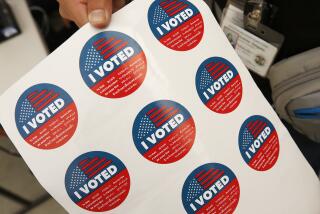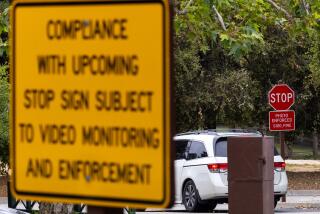County Gets Tough With Jury Duty Scofflaws
- Share via
So the dog ate your summons to jury duty? You cannot leave the kids alone--even if they are in college? Your pet poodle is in heat and you’re worried about the mongrel next door?
Riiight. Save your time, fill out the jury duty forms. Under a tough new program, officials have stiffened penalties and are pursuing those who duck their civic duties.
On Tuesday, the first batch of scofflaws were fined $1,500 for repeatedly failing to heed jury summonses for the past six years.
“We’re not doing this for show--we’re doing this because we mean it,” said Superior Court Judge Aurelio Munoz, chairman of a committee examining the jury system. “People have gotten used to avoiding jury service. It’s a matter of getting their attention and saying: ‘We mean it.’ ”
Two years ago, only about half of the 4 million residents who were sent forms bothered to reply--the county’s worst response rate ever. Word apparently had spread over an unofficial grapevine that you could dodge jury duty and suffer no consequences.
Yet the need for jurors has become greater than ever, especially since the “three strikes” law has meant a decrease in plea bargains and an increase in trials, judges say. Three months ago, a criminal case was dismissed in Los Angeles Superior Court because of a shortage of jurors, Munoz said.
Court officials last year began publicizing the get-tough campaign. This week, the pursuit began.
On Tuesday, 19 individuals were ordered to court--via letters mailed with return receipts requested.
Only two showed up. After filling out the juror affidavit forms, one woman was excused from jury duty without having to pay a penalty. She had a legitimate excuse--she could not understand English and therefore did not qualify as a juror, said Gloria Gomez, manager of Los Angeles County Juror Services.
Another individual arrived at court several hours late, saying he had gotten lost. His fine was forgiven, said Superior Court Assistant Presiding Judge Robert W. Parkin.
Seventeen people, however, never appeared. After waiting 35 minutes, Parkin ordered them to pay a $1,500 fine within 30 days. Once the individuals receive the order, they can appeal to have it set aside.
“We’d rather have these people serve on the jury than take their money,” Parkin said. “Even those who get served with the order, if they come within 30 days, we’ll set it aside provided they agree to fill out the [jury duty] affidavit and subject themselves to jury service.”
In an average year, Los Angeles County Juror Services sends out about 3 million forms requesting residents to supply enough information for officials to determine whether they qualify as jurors. (Residents who would be rejected include those who don’t understand English, are not U.S. citizens or are under 18.)
About 58,000 residents repeatedly spurn these forms, Gomez said. Those people will be the first targets of the get-tough campaign. They, like the 19 people on Tuesday, will be ordered to court in what will become daily sessions to process jury summons scofflaws, she said.
“There will be a few people making frantic phone calls,” predicted Judge Munoz, who attended the proceedings in Parkin’s court.
Once authorities have dispatched the hard-core cases, they will turn their attention to people currently avoiding jury service, Gomez said.
The fines, however, represent only one prong of a multifaceted approach to make service less onerous, which includes beefing up the telephone systems and jury assembly room improvements. The plan also includes educating judges to be more considerate of panelists and to try to avoid needless waiting and explain the reason for delays.
At the same time, officials who process potential jurors are heightening their surveillance. Jury duty poses a financial hardship? Officials will attempt to reach your employer, just to make sure, Gomez said.
Munoz and several judges said that since the campaign was first discussed last spring, residents have already begun to respond.
In the 1995-96 fiscal year, which is not yet over, 78% have filled out the jury information forms mailed to their homes--an increase of 15 percentage points over the previous year.
“Things are getting better because people are starting to realize we mean business,” said Superior Court Judge Judith C. Chirlin, a member of a committee examining the jury system.
Ultimately, the get-tough campaign could mean good news for those residents who dutifully serve as panelists. Eventually, residents may well find that they are summoned less frequently.
“The fact that there are so many people who don’t show up means the people who do show up get inappropriately and inordinately burdened,” Chirlin said. “That will change.”
More to Read
Sign up for Essential California
The most important California stories and recommendations in your inbox every morning.
You may occasionally receive promotional content from the Los Angeles Times.










